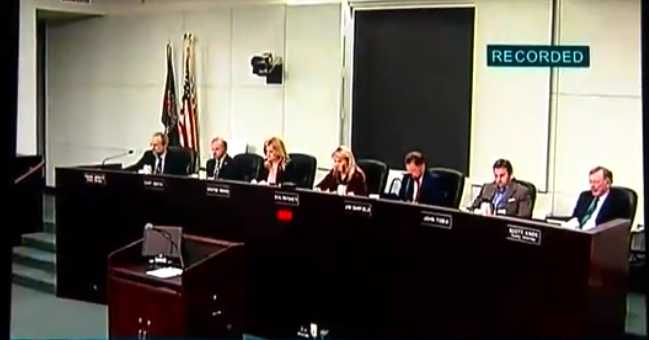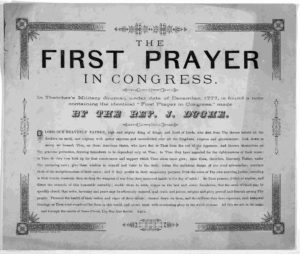 ATLANTA — The 11th Circuit Court of Appeals in Atlanta, Georgia has ruled that commissioners for one county in Florida were violating the Establishment Clause by “picking and choosing which religions to invite and which to reject” for the invocation presented at the start of each public meeting, and by preferring Christianity “to the exclusion of other religions.”
ATLANTA — The 11th Circuit Court of Appeals in Atlanta, Georgia has ruled that commissioners for one county in Florida were violating the Establishment Clause by “picking and choosing which religions to invite and which to reject” for the invocation presented at the start of each public meeting, and by preferring Christianity “to the exclusion of other religions.”
“Four of the seven commissioners, including three of the five who voted on the resolution [at issue], stated affirmatively that they would not allow representatives of certain religions to give an invocation. One said he would not allow a Wiccan, and two more said they probably would not. A Rastafarian would have received the same set of responses,” wrote Judge Stanley Marcus, nominated to the bench by then-President Bill Clinton, on behalf of the unanimous three-judge panel.
“Two commissioners said they would not allow a polytheist to deliver an invocation, even though they had each said they would allow a Hindu,” it noted. “Finally, these same four commissioners would bar a deist from delivering an invocation. … A bar on deism would exclude Thomas Jefferson, Benjamin Franklin, John Adams, and many others among our nation’s founders from the opportunity to deliver an invocation before the Brevard County Board of Commissioners.”
The court ruled that as the “selection procedures as practiced take religious beliefs into account, … favoring some creeds over others,” Brevard County has engaged in unconstitutional discrimination “on the basis of religion,” and has “violated the Establishment Clause.”
As previously reported, the matter began in 2014 when commissioners voted unanimously to deny a request from atheist David Williamson of the Central Florida Freethought Community after he asked that his group be added to the county’s invocation list.
The County replied that Williamson’s group did not qualify for the invocation because it is defined as a “prayer presented by members of [the] faith community.”
“The prayer is delivered during the ceremonial portion of the county’s meeting, and typically invokes guidance for the county commission from the highest spiritual authority, a higher authority which a substantial body of Brevard constituents believe to exist,” the response from the commissioners and the county attorney outlined.
“The invocation is also meant to lend gravity to the occasion, to reflect values long part of the county’s heritage, and to acknowledge the place religion holds in the lives of many private citizens in Brevard County.”
The County, still seeking to accommodate Williamson somehow, instead suggested that the Freethought group speak during the public comment period. The board voted unanimously in favor of formalizing the matter into a policy, which angered atheists who opined that the rule was discriminatory.
“Secular invocations and supplications from any organization whose precepts, tenets or principles espouse or promote reason, science, environmental factors, nature or ethics as guiding forces, ideologies, and philosophies that should be observed in the secular business or secular decision making process … must be placed on the public comment section of the secular business agenda,” Resolution 2015-101 read.
“Pre-meeting invocations shall continue to be delivered by persons from the faith-based community in perpetuation of the board’s tradition for over forty years.”
Williamson therefore sued the board along with others, and in 2017, U.S. District Judge John Antoon II, appointed to the bench by then-President Bill Clinton, ruled that the “county may not require theistic content in opening invocations.” He also ordered the commission to pay $60,000 in compensatory damages to the atheist entities that sued for not being permitted to deliver an invocation.
“By opening up its invocation practice to volunteer citizens but requiring that those citizens believe in a ‘higher power’ before they will be permitted to solemnize a board meeting, the county is violating the freedom of religious belief and conscience guaranteed by the Free Exercise Clause,” he contended.
Antoon opined that allowing only those who believe in God to deliver the prayer is “narrow” and an “instrument of division.”
“[T]he County’s assertion that a pre-meeting solemnizing invocation necessarily requires that a ‘higher power’ be invoked is an overly narrow view of an invocation,” he asserted. “The County limits the prayer opportunity to those it deems capable of doing so — based on the beliefs of the would-be prayer-giver. In doing so, the County discriminates among invocation speakers on the basis of viewpoint.”
The commissioners voted to appeal the ruling, with Commission Chair Rita Pritchett reportedly remarking that “there is a big attack on Christianity. I believe that’s where we are as a society.”
However, on Monday, the 11th Circuit Court of Appeals — while not reaching whether or not an atheist must be permitted to present the invocation — took issue with how the commission selects or rejects potential prayer presenters.
“Brevard County’s haphazard selection process categorically excludes certain faiths — some monotheistic and apparently all polytheistic ones — based on their belief systems. Most commissioners do not appear to have employed belief-neutral criteria in selecting which invocation-givers to invite. Their comments ‘reflect an aversion or bias on the part of [county] leaders against minority faiths,'” the court wrote.
It pointed to testimony by commissioners, which they said demonstrated “a preference for Christianity specifically at the expense and to the exclusion of other religions.”
“One former commissioner, who had been on the board when the plaintiffs first requested the opportunity to deliver an invocation, said the opening invocation was ‘a long-standing tradition of honoring the Christian community in Brevard County,’ and that allowing atheists or humanists to deliver invocations ‘would be a dishonor to the Christian community.'”
The court concluded that such was unconstitutional.
“We need not and do not reach any further questions presented in this case, including whether the county is obliged to allow the individual or organizational plaintiffs — atheists and Secular Humanists — the opportunity to deliver an invocation at the start of one of its board meetings,” Marcus wrote.
“Again, all that we hold today is that the board’s current invocation speaker selection procedures are unlawful,” he reiterated. “The commissioners have favored some religions over others, and barred those they did not approve of from being considered. This plainly violates the principle of denominational neutrality found at the heart of the Establishment Clause.”
The two judges concurring in the ruling were Britt Grant, nominated to the bench by President Trump, and Frank Hull, nominated to the bench by then-President Bill Clinton.

As previously reported, in April, an appeals court for the District of Columbia ruled in a separate case that U.S. Congress did not discriminate against Dan Barker of the Freedom From Religion Foundation (FFRF) in declining to permit him to present a secular invocation before the legislature.
“Even though we accept as true Barker’s allegation that [Chaplain] Conroy rejected him ‘because he is an atheist,’ the House’s requirement that prayers must be religious nonetheless precludes Barker from doing the very thing he asks us to order Conroy to allow him to do: deliver a secular prayer,” wrote Judge David Tatel on behalf of the unanimous three-judge panel.
“In other words, even if, as Barker alleges, he was actually excluded simply for being an atheist, he is entitled to none of the relief he seeks,” he said. “We could not order Conroy to allow Barker to deliver a secular invocation because the House permissibly limits the opening prayer to religious prayer.”
The first prayer delivered before the Continental Congress, offered by Jacob Duche of Christ Church of Philadelphia on Sept. 7, 1774, read, “O Lord our Heavenly Father, high and mighty King of kings, and Lord of lords, who dost from thy throne behold all the dwellers on earth and reignest with power supreme and uncontrolled over all the kingdoms, empires and governments: Look down in mercy, we beseech Thee, on these our American states, who have fled to Thee from the rod of the oppressor and thrown themselves on Thy gracious protection, desiring to be henceforth dependent only on Thee.”
The invocation concluded “in the name and through the merits of Jesus Christ, Thy Son and our Savior. Amen.”
Become a Christian News Network Supporter...


